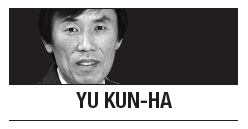The two main political parties are relapsing into confrontational mode over the National Intelligence Service’s alleged election-meddling scandal, raising concerns that the ongoing National Assembly session may be disrupted.
The scandal has reemerged as a burning issue following the court’s acquittal on Thursday of Kim Yong-pan, a former Seoul police chief who was indicted on charges of hampering a police probe into the allegations that the spy agency had meddled in the 2012 presidential election.
The ruling enraged the main opposition Democratic Party, which expected a verdict against the suspect. The party reiterated its demand that a special counsel be appointed to thoroughly investigate the allegations against the NIS and the former police official.
It also demanded that President Park Geun-hye fire Justice Minister Hwang Kyo-ahn immediately, claiming that he had played a key role in stonewalling prosecutors’ investigation into the state spy agency’s wrongdoing.
The party also urged Park to reshuffle the Cabinet as many ministers, including Finance Minister Hyun Oh-seok and Education Minister Seo Nam-soo, have lost public confidence. It filed motions with the Assembly calling for the dismissals of Hwang and Seo.
The ruling party dismissed the DP’s demands, saying that the court’s ruling was only natural as there was no evidence to prove Kim was guilty. It urged the opposition party to respect the court’s decision, warning that defying it would amount to negating the rule of law.
It is regrettable that the NIS scandal is again provoking a bitter political confrontation, threatening to paralyze the National Assembly. But the two parties should not let the rekindled dispute disrupt parliamentary sessions anymore. The nation simply cannot afford another year like 2013.
Last year was one of the worst years in terms of the number of bills passed. The Assembly could not clear many important bills aimed at revitalizing the economy and creating jobs due to the protracted standoff between the rival parties over the NIS issue.
The two parties are well aware of public criticism of stalled parliamentary proceedings that are imposing a drag on the economy. So they have recently started to bang the drum for political reform and explore ways to make the Assembly more productive.
In his New Year news conference, DP leader Kim Han-gil pledged that his party would spearhead efforts to restore dignity to politics, make politics more efficient and respond swiftly to the demands of the public.
On Feb. 3, Kim also proposed a drastic 12-point proposal to scrap many of the privileges granted to lawmakers and prevent them from abusing their power. Notably, it included a recall system to allow voters to determine the fate of lawmakers accused of corruption.
To implement his anticorruption measures, Kim called for the establishment of an independent ethics oversight committee separate from the existing parliamentary ethics panel. This new body is aimed at keeping close track of whether lawmakers and their aides abide by the code of ethics.
Saying that renouncing privileges was only the first step toward political reform, the DP leader unveiled two days later another set of proposals geared toward reforming the operation of the National Assembly.
Specifically, he called for year-round parliamentary sessions, increased parliamentary inspection of state affairs and making the Special Committee on Budget and Accounts a standing body.
Following Kim’s proposals, Choi Kyung-hwan, floor leader of the Saenuri Party, said he would form a parliamentary panel to explore ways to prevent parliamentary proceedings from coming to a complete halt due to political bickering.
Choi suggested a plan to separate undisputed bills from contentious ones so that they can be voted on quickly.
To make the Assembly function properly, it is necessary for the two main parties to find some civil ways of avoiding long parliamentary impasses. Some mechanism should be in place to ensure that legislative activities go on despite partisan wrangling.
Such a mechanism is necessary as under the present National Assembly Act, it is virtually impossible for the ruling party to pass any legislative bill without cooperation from the DP. The law is designed to prevent brawls in the parliament but the opposition party abused the new system last year.
Now, the two political parties are set to resume their fight over the NIS scandal even before starting serious negotiations on improving the operation of the National Assembly. They need to cool down and remember that the June 4 local elections are approaching.
They are facing increasing pressure for political reform as a new party championing “new politics” will be soon launched by Ahn Cheol-soo, a software entrepreneur-turned-independent lawmaker.
Ahn says his party will participate in the mayoral contests in the five largest cities and the gubernatorial elections in the 12 provinces. This is cause for alarm for the DP as Ahn’s party is more likely to erode its support base than that of the Saenuri Party.
Furthermore, the yet-to-be-created party enjoys a higher approval rating than the DP. An opinion poll conducted by Gallup Korea this month puts the standing for Ahn’s party at 25 percent, lower than the Saenuri’s 37 percent but higher than the DP’s 14 percent.
If the two main political parties again lock horns over the NIS scandal and disrupt parliamentary sessions, they will face stern judgment from voters in the June elections. To avoid such a result, they need to cooperate in establishing a new modus operandi for the Assembly and passing the bills that have been waiting for approval since last year.
By Yu Kun-ha
Yu Kun-ha is chief editorial writer of The Korea Herald. He can be reached at
khyu@heraldcorp.com. ―Ed.





![[Exclusive] Hyundai Mobis eyes closer ties with BYD](http://res.heraldm.com/phpwas/restmb_idxmake.php?idx=644&simg=/content/image/2024/11/25/20241125050044_0.jpg)
![[Herald Review] 'Gangnam B-Side' combines social realism with masterful suspense, performance](http://res.heraldm.com/phpwas/restmb_idxmake.php?idx=644&simg=/content/image/2024/11/25/20241125050072_0.jpg)

